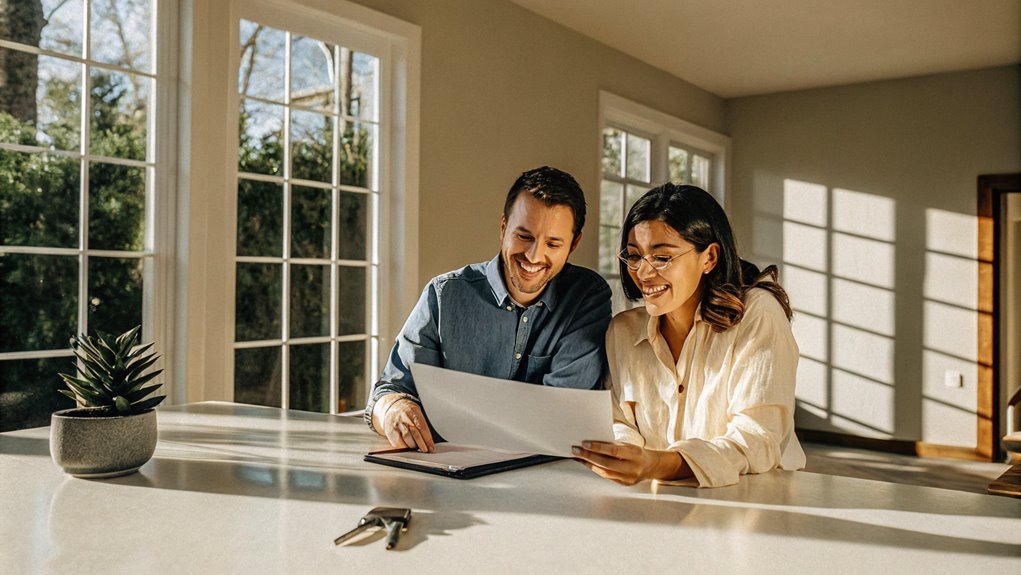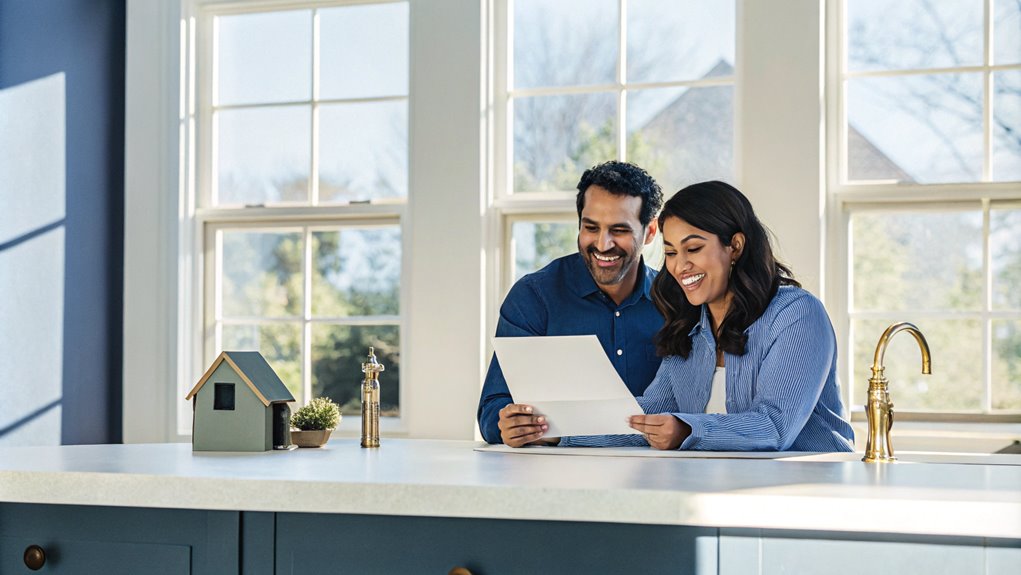Your home is important to you and your family. A fixed-rate home loan can make life easier. Think of it like this: your monthly payment stays the same no matter what. That means you pay the same amount each month for 15 or 30 years.
When other people's payments go up, yours won't change. This helps you save money and know what to expect. If you have good credit, you can get one of these loans. The better your credit, the better deal you can get.
Many people like fixed-rate loans because they are simple to understand. You can plan ahead and know how much money you need each month. This makes it easier to save up for other things you want.
Ready to start building equity in your own Michigan home? Get your personalized home loan quote today.
Understanding Fixed-Rate Mortgage Basics

Think of a fixed-rate home loan as a promise. You pay the same amount each month until you own your home. The bank won't change how much you owe, even if other loan rates go up or down.
Most people pick loans that last 15 or 30 years. When you make your monthly payment, part of it pays back what you borrowed. The other part pays the bank for letting you borrow the money. At first, more of your money goes to the bank. Later, more of it goes to buying your home.
You also need to pay for house taxes and home safety plans. The bank can hold this money for you and pay these bills when they come due. This makes paying for your home simple and easy to plan for.
Michigan residents, unlock the door to your new home. Request your home loan quote from Treeside Financial today.
Market Volatility Protection
Your home stays safe from money problems when you get a fixed-rate loan. Think of it like a shield that keeps your monthly payment the same all the time. No matter what happens with money in the world, you pay the same amount each month.
Many people like you pick this kind of loan. They sleep better at night knowing their house payment won't go up. Your friends with other types of loans might've to pay more when rates go up, but you don't.
In tough times, when prices go up and down, your payment stays the same. This lets you save money and plan for the future without fear.
Long-Term Financial Planning Benefits

Getting a fixed-rate mortgage helps you know what you'll pay each month for your home.
This makes it easy to plan your money for the future. You can save for retirement and put money aside because you won't be surprised by changing house payments.
A steady payment lets you make a simple plan for your money that fits your life today and tomorrow.
Predictable Monthly Housing Costs
Your home payment stays the same each month with a fixed-rate loan. You pay the same amount every time. This makes it easy to plan your money and know what to expect.
You don't have to worry when bank rates go up or down. Your payment won't jump up like it might with other types of loans. This helps you feel safe about your home costs.
Having a payment that doesn't change lets you save money for other things. You can plan for when you stop working or save for your kids to go to school.
Your house payment will stay the same, and that makes life easier.
Building Consistent Retirement Savings
Saving for your future is easier when you have a fixed house payment. You won't have surprises each month, so you can save the same amount of money for later.
Think of it like putting coins in a piggy bank:
- Your savings grow while you own your home
- Your monthly payment stays the same
- You build money in your home and in your savings at once
- Many smart people choose this path
- You can make a clear plan for saving
When you know what to pay for your home each month, you can keep saving money no matter what happens in the world. This helps you stick to your plan and reach your goals for when you stop working.
Monthly Payment Stability
Money you pay stays the same each month with a fixed-rate home loan. You'll pay the same amount on day one as you'll on the last day. This helps you know how much money to save each month.
When you lock in your rate, you won't have to worry when loan rates go up or down. Your basic home payment stays the same, even if taxes and home care costs change.
This safety helps when money gets tight or when rates start going up. Unlike loans that can change, your payment won't jump up and shock you.
Interest Rate Lock Advantages

Taking out a fixed-rate mortgage is like putting a safety lock on your home costs. Your monthly payment stays the same, no matter what happens to interest rates.
Think of it as a promise – you'll pay the same amount each month until you finish paying for your home. This makes it easy to plan your money each month.
You won't have to worry about your payments going up, even when other people's rates do. This peace of mind helps you sleep better at night, knowing exactly what you'll need to pay for your home every month.
Predictable Monthly Housing Costs
Your home payment stays the same each month with a fixed rate. This makes it easy to know how much money you need. You won't get any big money surprises. You can make plans for your future and feel safe in your home.
Think about what this means for you:
- You can sleep well at night
- You can save money for fun things
- You can live the way you want
- Market changes won't hurt your wallet
- You can dream big for your future
This is great for people buying their first home. It helps them build a strong money plan in their town.
Protection From Rate Increases
When you get a fixed-rate home loan, you lock in one rate that stays the same. This means your payments won't go up or down. It's like having a shield that keeps you safe from big changes in the money world.
Think of it like this: You and your friend both buy homes. You pick a fixed rate, but your friend picks a rate that can change. When rates go up, your friend has to pay more each month.
But you keep paying the same amount you agreed to at the start. Your rate stays the same for the whole loan – 15 or 30 years. This helps you know just how much to save each month for your home.
Fixed Versus Adjustable Rates
When you buy a home, you need to pick between two types of loans. One stays the same, and one can change over time.
A fixed rate means your house payment won't change. It's like having the same lunch money every day. You can plan better because you know what to expect each month.
An adjustable rate starts lower, but it can go up or down. Think of it like a swing – it might go up high when you don't want it to. This can make it hard to plan your money.
Many people like fixed rates because:
- They know their payment will stay the same
- They can make better plans for their money
- They don't have to worry about bigger payments later
- They feel safe about paying their loan
- They can save for other things without worry
You might pay a bit more at first with a fixed rate. But you won't have to worry about bigger payments in the future.
First-Time Buyer Considerations

Buying your first home is a big step. A fixed-rate home loan can help you feel safe about your choice. It lets you know just how much you'll pay each month until you own your home.
Your monthly bill will stay the same no matter what happens in the money world. This helps a lot when you're just starting out as a home owner. You won't get any scary jumps in your bills if bank rates go up.
Many new home buyers are also starting new jobs or growing their family. Having the same bill each month makes it easy to plan ahead. You can enjoy your new home and watch it grow in value without worry.
Building Home Equity
Your Home is Like a Piggy Bank
When you get a fixed-rate home loan, you start to own more of your home bit by bit. Each time you pay your monthly bill, two good things happen. First, you own more of your home. Second, your home might go up in value over time.
Think of it like filling up a piggy bank:
- You can see your share of the home get bigger each month
- Just like many other families, you build money you can pass down
- You know just how much of the home you own
- You can use the money you've built up when you need it
- Instead of paying rent, you're saving money in your home
As time goes by, owning more of your home helps you feel safe about money. You can stay in your home as long as you want, or use what you've saved to buy a new one.
Refinancing Your Current Mortgage

Want to save money on your home loan? You can get a new loan to replace your old one. This is called refinancing. It can help when new loan rates are much lower than what you pay now.
Getting a new loan can help you in many ways. You can:
- Pay less each month
- Pay off your loan faster
- Use your home's worth to pay for big things
Before you get a new loan, look at what it costs. You need to live in your home long enough to make back the money you spend on getting the new loan.
The bank will look at:
- How well you pay your bills
- How much money you make
- What your home is worth now
Tax Benefits and Deductions
Buying a home can help you save money on taxes. When you have a mortgage, you can subtract some costs from your taxes each year if you list them out.
The two main things you can subtract are:
- The interest you pay on your loan
- The property taxes you pay on your home
This can make owning a home cost less than renting. You save the most money in the first few years when you pay more interest.
Many people who own homes save lots of money this way. You know what to expect each year when you do your taxes. This helps you make better plans for your money.
As you pay your mortgage, you own more of your home. At the same time, you pay less in taxes. You can use the money you save for other things you need.
Talk to someone who knows about taxes. They can help you get all the savings you qualify for and follow the tax rules.
Qualifying for Fixed-Rate Mortgages

Getting a fixed-rate home loan is like making a big promise to your bank. You need to show them you can keep that promise.
Your credit score needs to be at least 620. If you have a better score of 740 or more, you can get a better deal. You also need to show you have kept the same job for about two years.
The bank looks at how much money you spend on bills each month. They want to see that your bills take up less than 43% of what you make. Some banks want it to be even less, like 36%.
You will need to pay some money up front. This is called a down payment. Most people pay between 3.5% and 20% of what the house costs. If you can pay more at first, you might get a better deal.
The bank will ask you for papers that show:
- How much money you make
- Where you work
- Your bank records
- Your tax papers
They want to know you have enough saved up to pay your bills for a few months, just in case.
Current Market Rate Analysis
Getting a home loan today means looking at what's happening with money in our world. Fixed-rate home loans stay the same over time, which is good for you. The rates you pay depend on what big banks do and how prices go up or down in stores.
When you lock in your rate:
- You won't worry about your payments going up
- You can plan better for the future
- Your monthly bill stays the same
- You don't have to stress about changing rates
- Your home costs stay steady even when prices rise
The rate you get now will set how much you pay each month for your home. This helps you know if you can afford the house you want.







